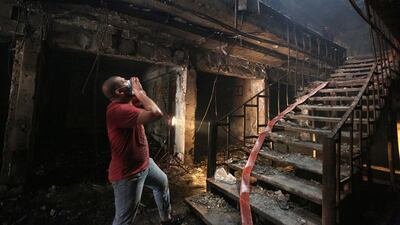After the startling attack on the Karrada district of Baghdad, Iraqis will be hoping that this latest attack was the last gasp of ISIL as it is driven out of areas around the capital.
Iraq is facing an extremely difficult security environment. Mosul is still under ISIL control. Fallujah has just been liberated – indeed, that may well have been the reason for the Baghdad attacks, as ISIL throws its last resources at the capital before retreating north to Mosul.
But the real battle, both in Fallujah and in Baghdad, is political. Prime minister Haider Al Abadi staked much of his authority on retaking Fallujah. Now that he has, he still finds himself beset by political challenges, on the battlefield and off it.
Mr Al Abadi, for all the challenges, is doing reasonably well. The Fallujah battle was over far more quickly than observers, especially western military observers, expected. The destruction, while vast, was not as bad as predicted. The refugee crisis created is severe.
Yet the battle for Fallujah also contained within it seeds of discontent. Fallujah was retaken with support from Iranian-backed militias, who are alleged to have committed atrocities against Sunni civilians.
Mr Al Abadi, to his credit given his reliance on the Shia-dominated Popular Mobilisation Forces military coalition, has made sure arrests were carried out and has pledged to investigate cases in Fallujah.
Yet a delicate balancing act is required, especially in the mainly Sunni city of Fallujah. About 100,000 civilians have been displaced, around a third of Fallujah’s population, and many of them are in makeshift camps on the outskirts. Returning them to their homes will be essential if Fallujah is to return to normal – and keeping them onside will be essential to ensuring ISIL cannot return.
But if the Shia militias remain in Fallujah, many of these Sunni civilians will not feel safe returning. Which leaves Mr Al Abadi with a conundrum: removing the militias from Fallujah means security could suffer. Leaving them in place means Sunni Iraqis will not return or there may be sectarian clashes – which would again mean security would suffer.
Back in Baghdad, too, there are troubles, although the focus on Fallujah temporarily shifted attention from Mr Al Abadi’s problems in parliament.
Little noticed by the international community, the country’s top court invalidated his technocratic cabinet. It did so by declaring the parliamentary session in which members had voted for the changes unconstitutional – creating a significant crisis that will only become apparent in a couple of weeks once parliament resumes.
For months, Mr Al Abadi has sought to change the composition of his cabinet, giving posts to technocrats rather than doling them out along sectarian lines, as the post-US-invasion system requires.
Parliamentarians, reluctant to give up the power and privileges that come with such political blocs, had refused to accept the cabinet. In April, under intense pressure from supporters of Shia cleric Muqtada Al Sadr, who protested outside the Green Zone in Baghdad, enough parliamentarians agreed to push the vote through. It was, naturally, questionable democratically, but Mr Al Abadi’s allies saw no other way to change the system of sectarian allocations.
Now that new cabinet has been overturned, meaning that when parliament resumes this month, the whole debate is likely to start again.
So far, Mr Al Abadi is proceeding inch by inch. Having won in Fallujah, he may find himself in a better position to face down his critics. But it will require a delicate balancing act.
The same forces are at play in the Baghdad parliament as on the streets of Fallujah. Shia groups in parliament and their backers are especially unwilling to give up any power. And indeed, any reduction in their power will increase instability in the country, as their supporters take to the streets.
And yet without a reduction in their power, Mr Al Abadi will not be able to genuinely reconcile with Sunni Iraqis, who have been cut off from ample representation. Without Sunni representation, any peace in the country will be merely temporary.
What is happening on the battlefield in Fallujah and what is happening in the grand halls of Baghdad’s parliament are then subject to the same political pressures.
It is in the spaces between the buildings of Fallujah and the political struggles in Baghdad that reconciliation will have to be found. And the answers Mr Al Abadi offers must be similarly nuanced, because the stakes, as the twin bombings in Baghdad last weekend show, could not be higher.
falyafai@thenational.ae
On Twitter: @FaisalAlYafai


